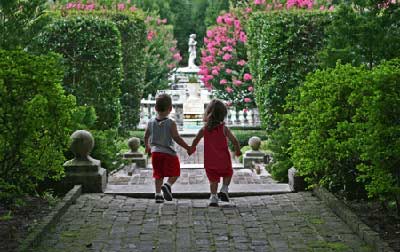在津巴布韋我家花園的盡頭,有一條長長的隧道,它成了我和孩子們玩耍的天堂。或許,我沒有以前同事和朋友們享有的繁華和舒適,但卻擁有她們體驗不到的別樣人生。

By Kate Chambers
王丁玎 選注
“Can we go to the tunnel, Mum?”
I close my laptop[1] with a sigh. In the kitchen, I collect the things two small boys will need for a picnic: a flask of homemade lemonade, the remains of a packet of ginger cookies.[2]
Sam and I found the tunnel soon after we moved to our red-roofed cottage in eastern Zimbabwe[3]. Half-hidden in the bushy scrapland at the bottom of the garden, it’s a five-yard-long pipe that’s wide enough for an adult to shimmy his way through.[4] At the height of Zimbabwe’s rainy season, a trickle[5] of water flows through it. In the dry April-August months, the pipe is empty and echoey, a magnet for small boys.[6]
“Auntie Kate, can we build a fire there?” Seamus, Sam’s friend, is jumping up and down with excitement.
I add a bundle of cotton balls and a tub of vaseline to the picnic basket.[7] I did not know how to make fire lighters[8] when I lived in Paris nearly 10 years ago.
A peanut-butter-colored kitten, the smallest of our tribe, trails the three of us as we traipse down the slope.[9] The boys scramble into the pipe with shouts of glee.[10] They coax the kitten in, drink their mugs of lemonade,[11] and ask for more.
“This is so cool,” Seamus says. His “cool” ricochets off the smooth concrete walls of the pipe.[12] “Cool... cool.”
A few yards away, I collect sticks for the kindling[13] I need to make tonight’s fire. The electricity will flick off[14] soon, as it does most days.
I had an e-mail today from a former colleague at the international news agency I once worked for in France. She’s now the head of a news bureau[15] in Asia. “My flat is in a modern Western-style building with a gym, a pool, and a shop,” she writes. “I have a housing allowance so it’s all free.”[16]
I love getting e-mails from my friends. Sasha, a speech and drama teacher, tells of toy libraries and her son’s Wii[17] games in rural middle England. Louise, a freelance[18] editor, writes of buying a flat in London and blogging in Spain. Emma, who sat next to me in many lectures at university, fills me in[19] on a recent holiday she took in Venice with her infant daughter. “I couldn’t remember how to say ‘crawl’ in Italian,” she laughs.
My friends’ missives[20] are fascinating windows into lives that I can’t help feeling might easily have been my own. Occasionally though, those e-mails can send me spiraling into self-doubt.
My 6-year-old son knows how to make a spinning top with a ripe loquat fruit and a toothpick.[21] But will he miss having a Wii game? If I’d persuaded my Zimbabwean husband to move with me to Paris, would we now be taking minibreaks in sunny European cities?
Would I have achieved more if I’d climbed a corporate ladder rather than launching a freelance life in a beautiful but underdeveloped African country?
To compare yourself with your contemporaries is human. But it is also good, I’m learning, to try to find contentment where you can. If today I lived in Paris with my family, we would visit the Musée d’Orsay and the Pompidou Centre.[22] Maybe we’d eat croque-monsieur[23] on Saturdays.
But there would be no tunnel at the bottom of the garden. My child wouldn’t live in a place where “blessing” is one of the most common words you hear.
When bread, fuel, and sugar were in short supply in Zimbabwe four years ago, I spent hours searching for basics on the main Herbert Chitepo Street. I was astonished by the number of shoppers who, in response to my greeting: “How are you?” answered: “I’m blessed.”
“Why?” I asked an acquaintance once, an elderly lecturer with degrees in classics and child development. “We don’t have much,” he explained simply (his monthly salary then was worth around $18). “But we have friends and homes and we made it[24] through another week.”
Zimbabweans believe in blessings so firmly that Chipo (which means “blessing” or “gift” in the local language) is a favorite baby name.
It’s 5 o’clock. In a newsroom in Paris, former colleagues will be pushing scheduled stories onto the newswire.[25]
I hear a crackle of twigs.[26] Seamus’s mother struggles her way through the undergrowth[27]. “You guys look like you’re having fun,” she smiles. We pour a bucket of water onto the embers of our fire and trudge up to the veranda.[28]
Later, I go back to the tunnel to collect the boys’ mugs. I flash my torch inside to where they were drawing cave pictures with bits of charcoal from my coal scuttle[29]. In smudged[30] letters, one of them has written the words: “Treasure. Here.”
Vocabulary
1. laptop: 筆記本電腦。
2. flask: 長頸瓶;lemonade: 檸檬(汽)水;ginger cookie: 姜汁餅干。
3. Zimbabwe: 津巴布韋,非洲南部一國家。
4. bushy: 植物茂密的;scrapland: 廢棄之地;shimmy: 扭肩擺臀。
5. trickle: 細流。
6. echoey: 有回聲的;magnet: 有吸引力的物或人。
7. tub: 塑料杯,紙杯;vaseline: 凡士林,人造礦脂。
8. lighter: 點火器,打火機。
9. 一只花生醬顏色的小貓——我們中間的小不點——尾隨著我們三人走下斜坡。traipse: 漫步,閑蕩。
10. scramble: 匍匐前進,爬行;glee: 歡喜,高興。
11. coax: 誘哄;mug: 圓筒形有柄大杯。
12. ricochet: 反彈,跳飛,此處指產生回音;concrete: 混凝土制的。
13. kindling: [總稱] 引火物。
14. flick off:(燈)一下子滅掉。
15. bureau: 分社,辦事處。
16. gym: 健身房;housing allowance: 住房津貼。
17. Wii: 是日本任天堂公司(Nintendo)出品的家用電視游戲機。
18. freelance: 做自由職業者的。
19. fill in: 向……提供最新消息。
20. missive: 信件。
21. 我六歲的兒子知道如何用生糍粑果和牙簽來做一個旋轉陀螺。
22. Musée d’Orsay: 奧賽博物館,位于塞納河的左岸,享有“歐洲最美的博物館”的美譽;Pompidou Centre: 蓬皮杜(國家藝術文化)中心,位于塞納河的右岸。
23. Croque Monsieur: 法式吐司,由香辣奶酪和火腿三明治制作而成,是地道的法國小吃。
24. make it: 做到,成功。
25. newsroom: 新聞編輯室;newswire: 新聞專線。
26. crackle: 噼啪聲;twig: 細枝。
27. undergrowth: 灌木叢,矮樹叢。
28. ember: 余火,余燼;trudge: 跋涉,吃力地走;veranda: 游廊,陽臺。
29. coal scuttle: 煤斗,煤桶。
30. smudged: 弄臟的,臟兮兮的。
(來源:英語學習雜志)